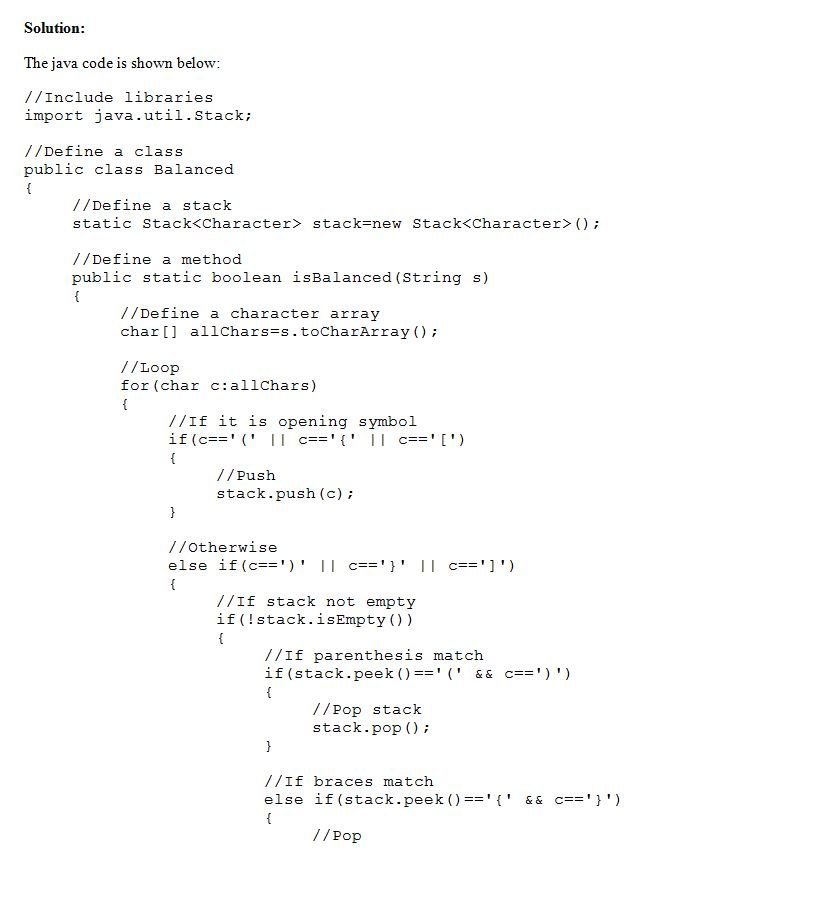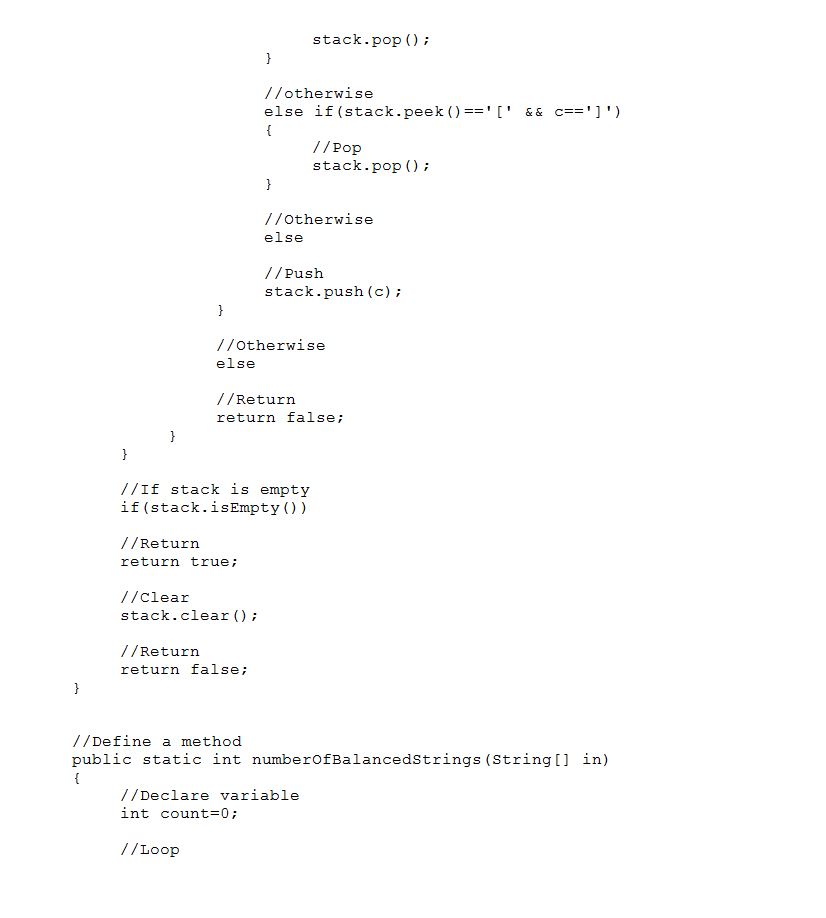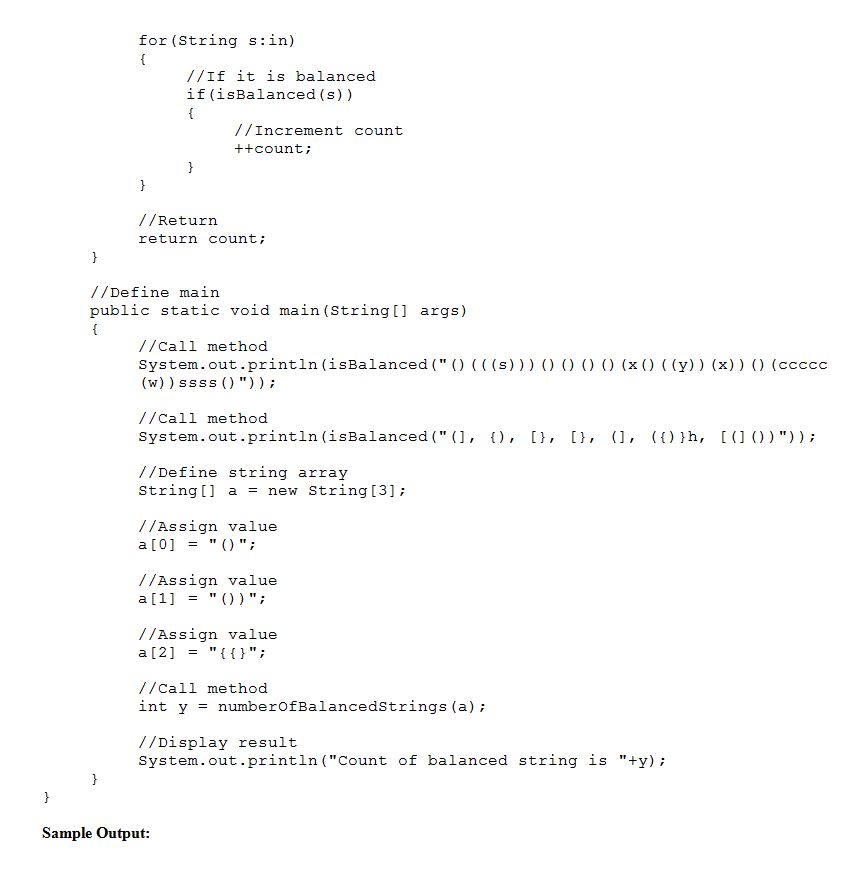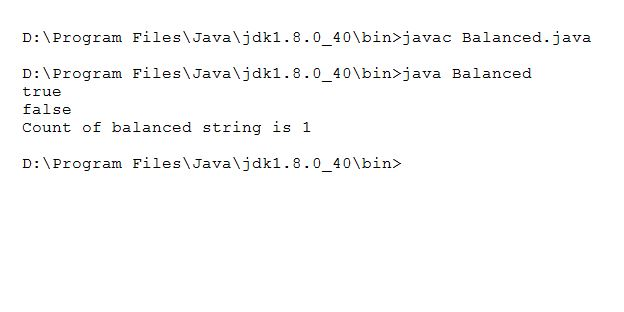need help with this code: have to complete the balanced code adding at the end of the code: with providing a testing code for the code.
A stack is a data structure where data is accessed using the LIFO (last in first out) principle. In this problem, you will use a stack to check whether a string has balanced parentheses (, ) and brackets {, }, [, ], or not.
A string that has balanced parentheses and brackets will be said to be balanced. Any character that is not one of (, ), [, ], {, or } is not important when deciding if a string is balanced and can be ignored.
We will define balanced as follows. A string str is balanced
if str does not contain a parenthesis or bracket symbol, or
str consists of a balanced string surrounded by opening and closing parentheses or matching brackets. That is, str is (b), {b} or [b], where b is any balanced string, or
if str is the concatenation of any two balanced strings. That is, str is bc, where b and c are any balanced strings.
You will complete the provided Balanced class that has two static methods isBalanced(String) and numberOfBalancedStrings(String[]).
Your isBalanced method must use the java.util.Stack class (in a way that solves the problem) to receive any grades for this problem.
http://docs.oracle.com/javase/8/docs/api/java/util/Stack.html
Examples
The following strings have balanced parentheses
(), ()()
cat, c(at), (hello)(kitty)
if( ((x-y) < 4) || (x > 12))
()(((s)))()()()()(x()((y))(x))()(ccccc(w))ssss()
The following strings do not have balances parentheses
), )(a), )a(
The following strings have balanced parentheses and brackets
a, [], {}, [()], []{}({[{}]}),
for(int i=0; i<12; i+=1){x[i]+=f(1);}
The following strings do not have balanced parentheses and brackets
(], {), [}, [}, (], ({)}h, [(]())
for(int i=0; i<12; i+=1){
Note: You will receive partial marks if you code only works for parentheses (and not brackets).
_________________________________
| import java.util.Stack; | |
| public class Balanced{ | |
| /** | |
| Checks if a string is balanced or not. | |
| @param s is a non-null string | |
| @return true of the input <code>s</code> is balanced and false otherwise. | |
| **/ | |
| public static boolean isBalanced(String s){ | |
| return false; | |
| } | |
| /** | |
| Counts the number of balanced strings in the input array. | |
| @param in is a non-null array of strings | |
| @return the number of strings in the input <code>in</code> that are balanced. | |
| **/ | |
| public static int numberOfBalancedStrings(String[] in){ | |
| return -1; | |
| } | |
| } |
Expert Answer




Code:
//Include libraries
import java.util.Stack;
//Define a class
public class Balanced
{
//Define a stack
static Stack<Character> stack=new Stack<Character>();
//Define a method
public static boolean isBalanced(String s)
{
//Define a character array
char[] allChars=s.toCharArray();
//Loop
for(char c:allChars)
{
//If it is opening symbol
if(c=='(‘ || c=='{‘ || c=='[‘)
{
//Push
stack.push(c);
}
//Otherwise
else if(c==’)’ || c==’}’ || c==’]’)
{
//If stack not empty
if(!stack.isEmpty())
{
//If parenthesis match
if(stack.peek()=='(‘ && c==’)’)
{
//Pop stack
stack.pop();
}
//If braces match
else if(stack.peek()=='{‘ && c==’}’)
{
//Pop
stack.pop();
}
//otherwise
else if(stack.peek()=='[‘ && c==’]’)
{
//Pop
stack.pop();
}
//Otherwise
else
//Push
stack.push(c);
}
//Otherwise
else
//Return
return false;
}
}
//If stack is empty
if(stack.isEmpty())
//Return
return true;
//Clear
stack.clear();
//Return
return false;
}
//Define a method
public static int numberOfBalancedStrings(String[] in)
{
//Declare variable
int count=0;
//Loop
for(String s:in)
{
//If it is balanced
if(isBalanced(s))
{
//Increment count
++count;
}
}
//Return
return count;
}
//Define main
public static void main(String[] args)
{
//Call method
System.out.println(isBalanced(“()(((s)))()()()()(x()((y))(x))()(ccccc(w))ssss()”));
//Call method
System.out.println(isBalanced(“(], {), [}, [}, (], ({)}h, [(]())”));
//Define string array
String[] a = new String[3];
//Assign value
a[0] = “()”;
//Assign value
a[1] = “())”;
//Assign value
a[2] = “{{}”;
//Call method
int y = numberOfBalancedStrings(a);
//Display result
System.out.println(“Count of balanced string is “+y);
}
}

